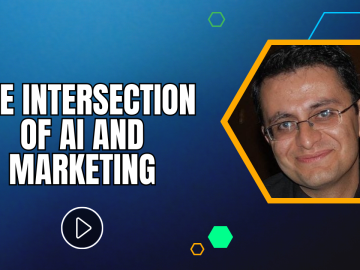The Gist
- AI-driven CMS evolution. The integration of AI into CMS has revolutionized content creation and management, shifting the focus from maintenance to innovation and significantly simplifying workflows.
- Personalization at scale. AI enables the rapid creation of personalized content variants, allowing businesses to experiment with and tailor messaging to diverse customer segments efficiently.
- Addressing AI implementation challenges. Effective AI adoption requires overcoming legal, compliance, and security concerns. Integrating AI within existing governance frameworks ensures safe and efficient deployment.
AUSTIN, Texas — The Contentstack ContentCon conference at the Hotel Van Zandt in Austin earlier this month provided a platform for industry leaders to delve into the transformative potential of generative AI, epitomized by the arrival of ChatGPT in November 2022. The conversation, led by Contentstack executives and customers, explored the profound impact of AI on content creation, marketing strategies and customer experiences.
Executives and customers caught up with CMSWire and reflected on the evolution of AI, its integration into content management systems (CMS) and the challenges and opportunities that lie ahead for brands seeking to harness the power of AI to drive innovation and differentiation in the digital landscape.
Evolution of Content Management Systems (CMS) and AI Integration
Gireesh Sahukar, vice president of digital at Dawn Foods and a Contentstack customer, offered a comprehensive exploration of the evolution of CMS and the integration of AI technologies within content marketing strategies. He provided a historical perspective, reflecting on the initial challenges faced when introducing modern CMS and ecommerce platforms to the market. Sahukar vividly described the reactions encountered, noting, “When we started this journey five years ago, there were mostly blank stares,” he said.
How so? “People had not heard of them or did not really understand how flexible the architecture was, and how much control it gave the business teams to rapidly operate and … make content changes and do what they needed to without any oversight,” he said.
He emphasized the revolutionary shift from traditional CMS systems to contemporary headless architectures, which have empowered content creators and marketers with unprecedented flexibility and autonomy. Sahukar illustrated the transformative impact of this transition, highlighting the simplification of content workflows and the reduction of technical barriers.
“With the modern, headless architectures, what’s happening is the content users are doing their work … with CMS with its built-in frameworks and publication workflows,” he said. “And the presentation will pick up anything and everything that is published.”
APIs make everything accessible. If an API is published, you can access it easily; just press enter, he said. All components have a well-understood, user-friendly presentation. This means minimal developer involvement is needed, simplifying the process. Previously, technology resources spent about 30% of their time on new features and 70% on maintenance, according to Sahukar. Now, that ratio has improved.
We can now incorporate new releases from platform ISVs, such as personalized content or AI acceleration assistance, much more efficiently, he said. Developers can quickly integrate these features, allowing business users to leverage these new capabilities, according to Sahukar. As a result, there’s a shift from maintaining and managing existing content and assets to focusing on innovation and new developments.
Related Article: Beyond the Hype: Real-World Impact of Generative AI in Content Management
Utilizing AI Across Different Business Functions
Sahukar expanded upon the multifaceted applications of AI beyond digital experiences, delving into its role in manufacturing processes and demand forecasting within Dawn Foods. He elaborated on leveraging AI-powered tools like Jasper for composing messages and generating content variants at scale. In terms of digital experience, “AI tools are embedded in all the planning and inventory management and planning, demand forecasting, those kinds of things. They have been really, really good,” Sahukar explained.
He underscored the significance of AI in streamlining operations and enhancing personalized messaging, particularly in catering to diverse customer segments. Sahukar illustrated this with examples from Dawn Foods’ clientele, ranging from cake shops to full-line bakeries, emphasizing the need for targeted messaging and rapid experimentation facilitated by AI technologies.
“You run into the need for creating hundreds of variants for the same piece of content,” he said. “AI can do that at scale and in a fairly short amount of time in seconds. So that gives you the ability to scale, the ability to personalize your message to your audience. … If it’s not resonating, pull it out, put a different version of the same messaging. And AI will help you generate alternate messages where we rapidly get 30 to 40 alternates really really fast.”
View all
Challenges and Opportunities in AI Implementation
Addressing the challenges and opportunities in AI implementation, Sahukar emphasized the need to streamline content creation and publishing workflows to fully leverage AI’s potential. He highlighted the complexities involved in content migration and the importance of automating processes to optimize efficiency. “It’s fairly simple ones that we have … we need to figure out what are some of the more complicated paths that are happening from a content creation and content publishing workflow perspective,” Sahukar noted.
Furthermore, he emphasized the transformative impact of AI in minimizing human effort and enhancing productivity across various business functions. Sahukar concluded by highlighting the ongoing exploration of AI’s capabilities, particularly in areas such as demand forecasting and automation, to drive further innovation within Dawn Foods.
Gurdeep Dhillon, chief marketing officer at Contentstack, delved into the challenges faced by customers in implementing AI solutions, particularly regarding legal, compliance and security concerns. He underscored the importance of addressing these barriers to foster trust and confidence in AI technologies.
Dhillon advocated for integrating AI functionalities within existing CMS platforms, emphasizing the need for seamless integration to ensure governance and compliance. He highlighted Contentstack’s commitment to simplifying AI adoption through comprehensive education and support initiatives, aimed at empowering marketers to leverage AI effectively while mitigating associated risks.
“One of the most common things we hear is we want to do it but our legal team, our compliance and security team … they don’t want to risk AI creating vulnerabilities and exposing things that shouldn’t be exposed,” Dhillon said. That’s why Contentstack touts its AI integrations with content management systems, where, according to Dhillon, there are “already the governance and workflows and user push restrictions built in. So those teams that are kind of blocking your start with AI can feel a lot better about it, knowing that it’s there, those guardrails are in place.”
Related Article: AI in Marketing: Balancing Creativity and Algorithms for Marketers
The Impact of Generative AI on Marketing Creativity
Dhillon reflected on the transformative impact of generative AI on marketing creativity since its mainstream arrival in November 2022. He described the emergence of generative AI as a “sea change moment,” igniting creativity and innovation within digital teams and marketing spheres.
Dhillon emphasized the role of generative AI in reimagining what’s possible, driving marketers to explore new avenues and possibilities in content creation and engagement. He noted the iterative nature of AI development, highlighting the continuous evolution of technology and its implications for marketing strategies.
“It just felt like a spark for creativity,” Dhillon said of ChatGPT’s emergence. “And it lines with our message which is reimagining what’s possible. It was game-changing.”
Democratizing AI Adoption for Brands
Neha Sampat, CEO of Contentstack, offered her perspective on democratizing AI adoption for brands, particularly focusing on simplifying the complexity surrounding AI implementation. Sampat emphasized the role of Contentstack’s AI accelerator in facilitating AI experimentation and integration within organizations. She highlighted the platform’s ability to streamline AI learning processes, enabling brands to harness AI technologies without requiring extensive technical expertise.
Sampat underscored the importance of removing barriers to AI adoption, emphasizing the platform’s role in empowering brands to leverage AI-driven insights and automation effectively. Sampat also addressed common concerns and challenges faced by customers in adopting AI solutions, particularly emphasizing the need to alleviate fears surrounding data privacy and security. She highlighted Contentstack’s commitment to addressing these concerns through robust governance frameworks and compliance measures, ensuring that AI-driven initiatives prioritize data integrity and user privacy.
Sampat emphasized the importance of building trust and confidence in AI technologies, advocating for transparent communication and education to empower customers in navigating AI implementation challenges effectively. She mentioned we’re in the “opt-in economy,” where the onus is on the marketers to be creative, thoughtful and reliable for consumers who want their privacy respected.
“So if we really think about how that evolves in the opt-in economy into new channels, and the role of AI and all that, marketers are going to have to build the coolest and most important brand experiences that actually earn your optimism,” she said. “So it shifts the burden to the brands to become relevant by doing things that are interesting and to earn that attention.”





